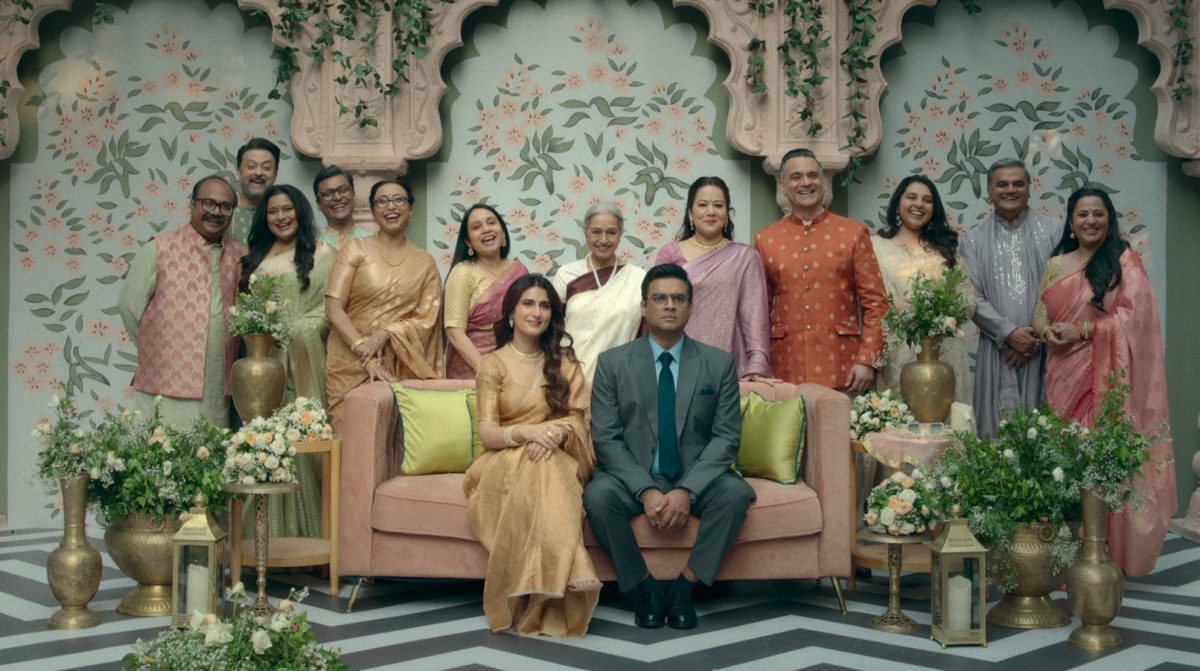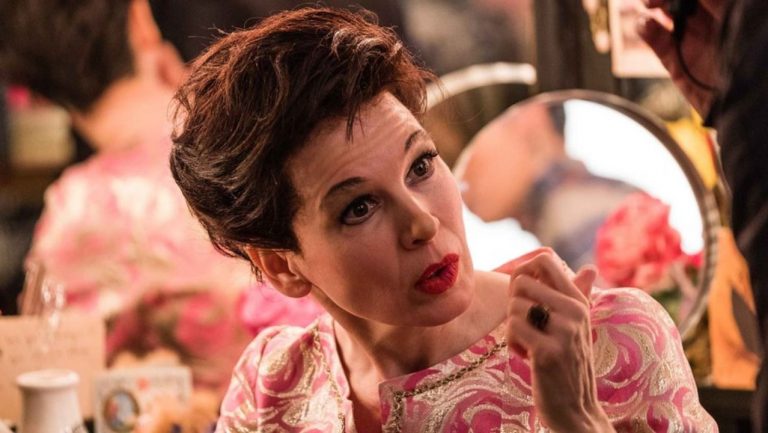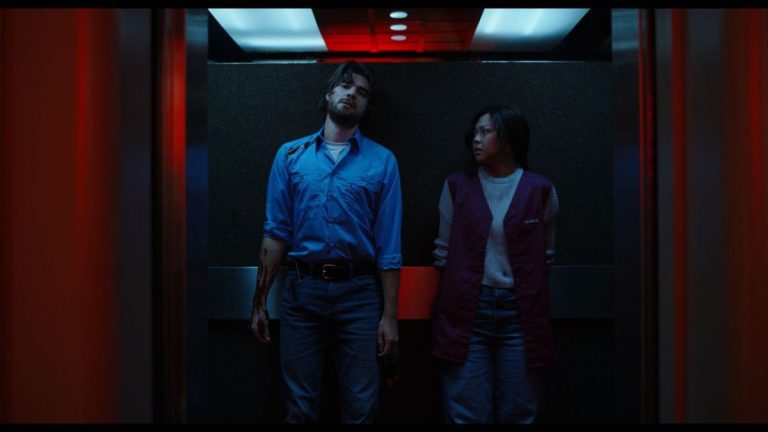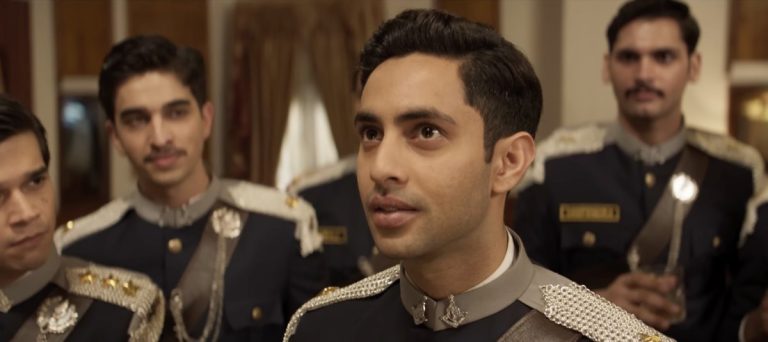Produced by Karan Johar’s Dharmatic Entertainment, the Netflix romcom “Aap Jaisa Koi” channels the energy of yesterday’s leftovers. But, boy, does it present itself in a meticulously designed plate. Fortunately for director Vivek Soni, style does go a long way when it comes to cinema. Style, itself, could very well be substance. It is only in that spirit, one can find joy in this otherwise middling affair.
“Aap Jaisa Koi,” starring R. Madhavan and Fatima Sana Shaikh, has a strong resemblance to “Rocky aur Rani Kii Prem Kahaani,” Karan Johar’s bigger and more boisterous blockbuster from two years ago. It is director Vivek Soni’s unique visual language that salvages, nay, elevates, this generic, more middling version of the same film.
Like “Rocky aur Rani,” “Aap Jaisa Koi” balances itself as a romantic escapade amidst a gargantuan clash of the opposites. Shrirenu Tripathi (Madhavan) is a forty-something Sanskrit teacher in Jamshedpur. He is presented as a Steve Carell-coded (a literal forty-year-old virgin) lovable incel. Except that he is from India, and like fifty percent of Indian men (the number should be higher), as the film noted, Shrirenu reeks of patriarchal pitfalls.
The film is quick to point to the men surrounding Shrirenu. His older brother, Bhanu (Manish Chaudhari), and best friend, Deepak (Namit Das), aren’t exactly the bastions of equality. Bhanu is someone who considers himself an ally of feminism just because he ‘allows’ his daughter to work, while reminding her to learn household chores as well. Kusum (Ayesha Raza), Bhanu’s oft-belittled wife, cannot help but feel her love for the dream-quasher dissipate.
On the other hand, Madhu (Sana Shaikh), coming from a Bengali household, can be termed as woke (again, the film’s words). This is straight out of the “Rocky aur Rani” (or “Vicky Donor” if you prefer it) playbook. As a Bengali myself, this deification of Bengalis as the champions of morality and progressive thinking does reek of misplaced flattery, especially when we are no longer exempt from the overall moral degradation that has gripped the nation.
The Bengali stereotyping is lazy and a bit indelicate. For instance, Madhu’s divorced uncle, Joy (Shaheb Chatterjee), who would play a pivotal role later, gets cartoonishly wide-eyed when announcing he has purchased ‘Hilsa’ (Perhaps the most important fish in Bengali delicacy). Granted, I will probably channel Shaheb Chatterjee myself at the prospect of having ‘Hilsa,’ but come on, that is one low-hanging fruit when it comes to portraying Bengali-ness.

Written by Radhika Anand and Jehan Handa, “Aap Jaisa Koi” gets its name from the titular sex-chatting app. The app that Shrirenu used before meeting Madhu. The moment Madhu enters the scene, that entire sex-chatting plot goes out the window, and you know that it is going to come back in the most obvious way possible. A more transparent Chekov’s gun is not possible.
The romcom’s biggest hitch, Shrirenu finding out Madhu also used to have sex chats, is flimsy. However, so is the average male ego of this country. So, when Madhu gets dragged into this battle over something which she also finds ridiculously trivial, it is not without a shade of realism. I will give the writers that.
Madhavan and Sana Shaikh form a couple that does not exactly inspire vicarious investment. In fact, their Shrirenu and Madhu always seem to be destined for doom. So much so that you might not want them to be together by the end. There is a tiredness in both actors’ portrayals. However, despite all this negativity, the film shines through the astute direction of Vivek Soni and Debojeet Ray’s beautiful camerawork.
That is where “Aap Jaisa Koi” feels different, despite the story offering no signs of it. Soni’s filmmaking vision is remarkably captured, and that is quite rare in commercial Bollywood films. That deserves plaudits. There is a particularly well-crafted song sequence where Madhavan’s Shrirenu initiates his sex-chat escapades. Shrirenu, hitherto doing everything alone, seems to be joined by a nameless woman, marking a sharp exit from his lonely nights.
The number of women in the sequence increases as he continues to chat with different women in the app. It is not ingenious per se. But it deserves a mention. “Aap Jaisa Koi” has plenty of such instances. Sure, with the addition of painstakingly conceived production design, much of Jamshedpur and Kolkata carries a sense of fakery. However, cinema is the biggest fraud ever, as noted by Jean-Luc Godard. And this exuberant rendition of the finest deception is the saving grace of the film. Might just be enough to like it even.

![Finding Bliss: Fire and Ice [2022]: ‘ NYAFF’ Review – An Insightful Exploration of Value of Art in Our Lives](https://79468c92.delivery.rocketcdn.me/wp-content/uploads/2022/07/FINDING-BLISS_-FIRE-AND-ICE-THE-DIRECTORS-CUT-MOVIE-REVIEW-1-768x432.jpg)



